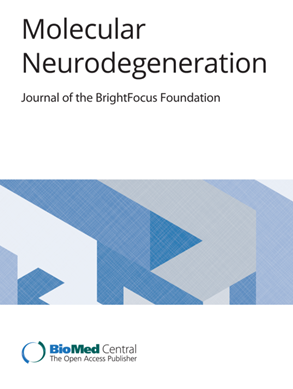靶向rna的CRISPR/CasRx系统缓解亨廷顿病模型的疾病症状
IF 17.5
1区 医学
Q1 NEUROSCIENCES
引用次数: 0
摘要
HD 是一种毁灭性的神经退行性疾病,由 HTT 中的 CAG 重复序列扩增引起。抑制突变蛋白的表达是拯救HD患者的治疗方向,而CRISPR/CasRx等基因编辑技术的最新进展为治疗干预开辟了新途径。CRISPR/CasRx 系统被用于靶向人类 HTT 第 1 外显子,从而有效地敲除 HTT mRNA。这种治疗效果在多种模型中得到了证实:HEK 293 T 细胞、HD 140Q-KI 小鼠和 HD-KI 猪模型。通过 Western 印迹和 RT-qPCR 分析了基因敲除的效率。此外,还通过 Western 印迹、免疫染色和 RNA 测序检查了神经病理学变化。通过行为实验评估了对运动能力的影响,从而全面评估了治疗效果。CRISPR/CasRx 系统能显著降低各种模型的 HTT mRNA 水平,包括 HEK 293 T 细胞、处于不同疾病阶段的 HD 140Q-KI 小鼠和 HD-KI 猪,并导致 mHTT 的表达减少。利用CRISPR/CasRx系统敲除HTT RNA可改善HD 140Q-KI小鼠的神经胶质病变,并延缓HD猪的神经变性。这些发现凸显了 RNA 靶向 CRISPR/CasRx 作为一种潜在的 HD 治疗策略的有效性。此外,这种方法的成功还为治疗由基因突变引起的其他遗传性疾病提供了宝贵的见解和新的途径。本文章由计算机程序翻译,如有差异,请以英文原文为准。
RNA-Targeting CRISPR/CasRx system relieves disease symptoms in Huntington’s disease models
HD is a devastating neurodegenerative disorder caused by the expansion of CAG repeats in the HTT. Silencing the expression of mutated proteins is a therapeutic direction to rescue HD patients, and recent advances in gene editing technology such as CRISPR/CasRx have opened up new avenues for therapeutic intervention. The CRISPR/CasRx system was employed to target human HTT exon 1, resulting in an efficient knockdown of HTT mRNA. This therapeutic effect was substantiated in various models: HEK 293 T cell, the HD 140Q-KI mouse, and the HD-KI pig model. The efficiency of the knockdown was analyzed through Western blot and RT-qPCR. Additionally, neuropathological changes were examined using Western blot, immunostaining, and RNA sequencing. The impact on motor abilities was assessed via behavioral experiments, providing a comprehensive evaluation of the treatment's effectiveness. CRISPR/CasRx system can significantly reduce HTT mRNA levels across various models, including HEK 293 T cells, HD 140Q-KI mice at various disease stages, and HD-KI pigs, and resulted in decreased expression of mHTT. Utilizing the CRISPR/CasRx system to knock down HTT RNA has shown to ameliorate gliosis in HD 140Q-KI mice and delay neurodegeneration in HD pigs. These findings highlight the effectiveness of the RNA-targeting CRISPR/CasRx as a potential therapeutic strategy for HD. Furthermore, the success of this approach provides valuable insights and novel avenues for the treatment of other genetic disorders caused by gene mutations.
求助全文
通过发布文献求助,成功后即可免费获取论文全文。
去求助
来源期刊

Molecular Neurodegeneration
医学-神经科学
CiteScore
23.00
自引率
4.60%
发文量
78
审稿时长
6-12 weeks
期刊介绍:
Molecular Neurodegeneration, an open-access, peer-reviewed journal, comprehensively covers neurodegeneration research at the molecular and cellular levels.
Neurodegenerative diseases, such as Alzheimer's, Parkinson's, Huntington's, and prion diseases, fall under its purview. These disorders, often linked to advanced aging and characterized by varying degrees of dementia, pose a significant public health concern with the growing aging population. Recent strides in understanding the molecular and cellular mechanisms of these neurodegenerative disorders offer valuable insights into their pathogenesis.
 求助内容:
求助内容: 应助结果提醒方式:
应助结果提醒方式:


